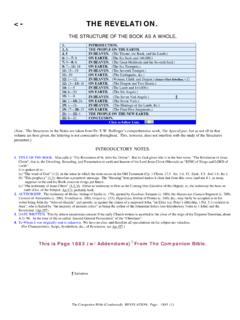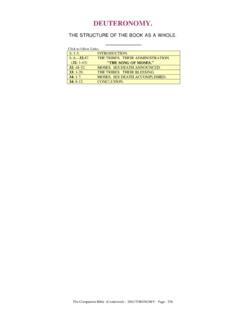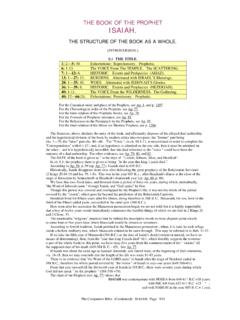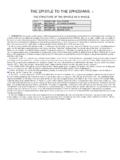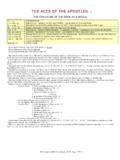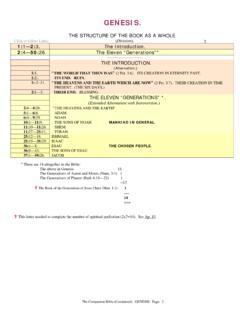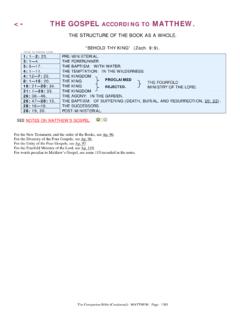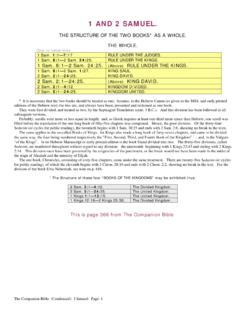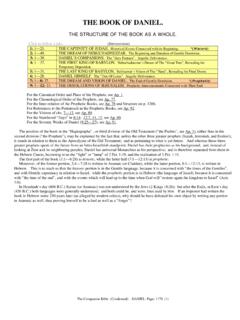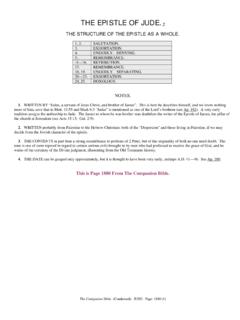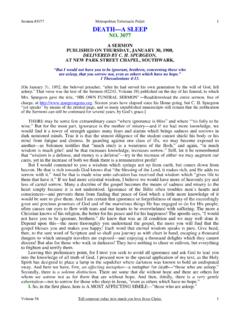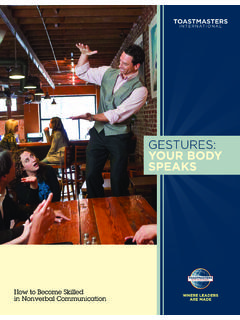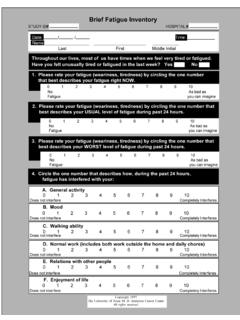Transcription of THE STRUCTURE OF THE BOOK AS A WHOLE.
1 1 ECCLESIASTES; OR, THE PREACHER. The Companion Bible (Condensed): ECCLESIASTES: Page: 906 ----------------------------- THE STRUCTURE OF THE book AS A WHOLE. 1: 1. INTRODUCTION. 1: 2 6: 9. THE CHIEF GOOD. WHAT IT IS NOT. 6: 10 12: 12. THE CHIEF GOOD. WHAT IT IS. 12: 13, 14. CONCLUSION. 1 The name of this book comes direct from the Latin Vulgate through the Sept. version. The Hebrew name is KOHELETH = Assembler or Convener (an appellative, not a proper name). It is feminine, to agree with the word Wisdom , which is feminine, and is therefore Wisdom personified (as in Prov. 1:20; 8:7, and always with masculine verbs. Cp. Matt. 11. 19. Luke 7. 35; 11:49, 50). KOHELETH is from kahal = to call, assemble, or gather together. This is what Solomon did (1 Kings 8:1, 2, 5). It occurs with a feminine verb in 7:27.
2 The word Koheleth occurs seven times in the book (Ap. 10): three times at the beginning (1:l, 2, 12); three times at the end (12:8, 9, 10); and once in the middle (7:27). This book formed part of the Hebrew Bible long before the time of Christ, and is therefore included in His word, "the Scriptures" (Matt 22:29. 2 Tim. 3:16, &c). It is given in the list of canonical books by Josephus ( 37), and is included in all the Ancient Versions made before Christ. It has been rejected by some, or put to a late date, on account of its alleged Theology. Theology is man's reasoning about the Word of God, as Science (so called) is man's reasoning about the Works of God. Because Genesis does not agree with Science that book is rejected by Rationalists. Because Ecclesiastes does not agree with Theology, this book is rejected, as uninspired, even by some Evangelical theologians.
3 True, the Bible contains an inspired record of what people said and did; and it does not follow that all that they said or did was inspired. Nevertheless, it is inconceivable that this can apply to a whole book , without a word of warning. Those who can imagine such a thing refuse the evidence that Christ in Luke 16:19-30 is using the language of His enemies, and in v. 31 giving His own Divine pronouncement. They strain out the gnat and swallow the camel. They do not see that, if anyone whole book is not apart of "THE ORACLES OF GOD", every Christian doctrine loses its foundation. There could have been in that case no Divine selection or preservation of books, and no Divine CANON OF SCRIPTURE. If ONE book is thus ruled out, then another may be. Doubt is thus cast upon the whole Bible, and we have no "Word of God" at all!
4 If this book be not part of the Word and words of God, then we have no reply to those who reject Genesis, Daniel, Jonah, or the Apocalypse, who do so on the same ground of human reasoning. If the inner consciousness of each individual is to decide what is and what is not "Scripture", there is an end of Divine Revelation altogether. In any case Solomon's "wisdom" was given him by God (1 Kings 3:5-12; 4:29-34), and this "wisdom" was therefore "from above" (Jas. 3:17), as Luke's was (see note on Luke 1:3). Moreover, Solomon did not lose it, for it "remained with" him (Ecc. 2:9). ECCLESIASTES; OR, THE PREACHER. The Companion Bible (Condensed): ECCLESIASTES: Page: 907 1 The words of the Preacher, the son of David, king in Jerusalem. 2 Vanity of vanities, saith the Preacher, vanity of vanities; the sum total of human labours is vanity.
5 3 What profit hath the natural man of all his toil which he taketh under the sun? 4 One generation passeth away, and another generation cometh: but the earth standeth still for ages. 5 The sun also ariseth; and the sun goeth down; and hasteth to his place where he arose. 6 The wind goeth toward the south, and turneth about unto the north; the wind whirleth about continually, and the wind returneth again according to his circuits. 7 All the rivers run into the sea; yet the sea is not full; unto the place from whence the rivers come, thither they return again. 8 All things are full of weariness; man cannot utter it: and the eye is not satisfied with seeing, nor the ear filled with hearing. 9 The thing that hath been, it is that which shall be; and that which is done is that which shall be done: and there is no new thing 3under the sun.
6 10 Is there any thing whereof it may be said, See, this is new? it hath been already of old time, which was before us. 11 There is no memorial of former men; neither shall there be any remembrance of things that are to come with those that shall come after them. 12 I 1the Preacher came to be king over Israel in Jerusalem. 13 And I gave my heart to seek and search out by wisdom concerning all things that are done under the sun: this sore travail hath God given to the sons of man to be humbled therewith. and reconciled and harmonized as other supposed "discrepancies" usually are; not cast aside as uninspired. It may be that it is man's theology which has yet to be conformed to these inspired statements. 4 abideth = standeth still, as in first occurrence (Gen. 18. 8, 22; 19. 27. Josh. 18. 5. Ps. 119. 90). for ever.
7 Heb. 'olam = for ages; 'olam occurs in Ecc. seven times : 1. 4, 10; 2. 16; 3. 11, 14; 9. 6; 12. 5. See the notes thereon. It = the world in relation to time past and future : as we use it when we speak of the ancient world, the old world, the modern world, the world to come, the Roman 5 The Heb. pauses in this verse are remarkable, and need a semicolon between each clause. 6 wind. Heb. ruach. Ap. 9. The first part of v. 6 continues the motion of the sun, going to the south (in winter) and turning about to the north (in summer). it whirleth: i. e. the wind whirleth. This is the subject of 7 they return again. This is the point of the illustration. Cp. Job 36. 27. 8 labour = weariness. man. Heb. 'ish. Ap. 14. II. the eye. Some codices, with Aram., Sept., and Syr., read "and the eye".
8 11 remembrance = memorial. of former things. Supply the Ellipsis (Ap. 6) with the word "men", to complete the argument from vv. 2-4-. The Chaldee for the former [men] version supplies the word "generation". after = "after [them]", or at the last. 1:12 2:26 [For STRUCTURE see next page]. 12 I. Solomon knew that the kingdom was to be rent (1 Kings , 12) and the People scattered; therefore he sought to kill Jeroboam (1 Kings 11. 39-40). The Chald. Targum says, on v. 1: "These are the words of the prophecy which Koheleth delivered when Solomon foresaw, by the Spirit of prophecy, that the kingdom of Rehoboam his son would be divided by Jeroboam the son of Nebat". was = came to be. over Israel. Solomon was the only king of which this was wholly true. 13 wisdom. Heb. chokmah.
9 See note on Prov. 1. 2. under heaven = under the heavens. Some codices, with one early printed edition, Aram., Syr., and Vulg., read "under the sun". God. Heb. Elohim. Ap. 4. I. The title "Jehovah" is not used in Ecclesiastes, as this book refers to man in relation to his Creator only; not to man in covenant with Him as "Jehovah". Hence the frequent use of Heb. 'adam for "man" in this book . exercised = humbled. 1 The words. Rashi says that, when this expression occurs at the beginning of a book , it shows that the book is meant for reproof, and he gives evidence from Deut. 1:1 (cp. 32. 15). Amos (cp. 4. 1). Jer. 1. 1 (cp. 30. 6). David, 2 Sam. 23. 1 (cp. v. 6). the Preacher. This comes from Luther's version "Prediger"; but "Koheleth" does not include the idea of preaching. Some of its teaching is individual ( ); and succeeding appeals are in the second person.
10 1: 2 6: 9. THE CHIEF GOOD. WHAT IT IS NOT. 1: 2-11. Man. His labour. Vanity. 1: 12--2: 26. Personal search. 3: 1-9. Man. Times for his labour. 3: 10--4: 16. Personal Observation. 5: 1-12. Man. His works. 5: 13--6: 9. Personal Observation. = 1: 2-11. MAN. HIS LABOUR. 2-7. Transience. Passeth away . 8. Dissatisfaction. 9, 10. Recurrence. 11. Oblivion. 2 Vanity of vanities. Fig. Polyptoton. Note also the Fig. Epanadiplosis (Ap. 6), by which v. 2 begins and ends with the same word. These Figures are used for the greatest emphasis, and denote utter vanity. all = the whole, or "the sum total". Not everything in the universe, but all the human labours of v. 3, 8. vanity. Heb habal, used of that which soon vanishes. 3 man. Heb. 'adam =the natural man. Ap. 14. I. labour = toil. under the sun.
